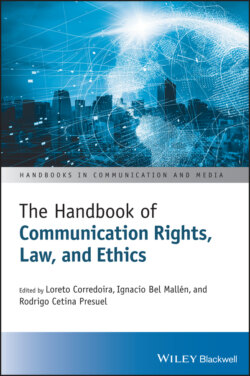Читать книгу The Handbook of Communication Rights, Law, and Ethics - Группа авторов - Страница 13
1 Freedom as the Essential Basis for Communication Rights
ОглавлениеIgnacio Bel Mallén
This chapter argues that no right can be exercised without freedom. Within this framework, I analyze the classic concept of freedom, which has served as the basis for the fight to secure rights for the press, book publishers, and individuals for the past 17 centuries. Freedom is what all human actions have had in common when people have claimed rights from the powerful, from the right to print without fear of censorship to communication rights as they appear in the Universal Declaration of Human Rights (UDHR) and as they have been studied by scholars.
There have been many authors based in the fields of law and politics, and even sociologists, who have analyzed and addressed the UDHR, from the points of view not only of human rights and the foundation of human beings’ liberties and rights but also of their relationship with politics, culture, and ethics. These authors include, among others, Desantes, Glendon, Romain Parmenteir, Oraa, Gomez Isa, and Gimbernat. Not surprisingly, the recent commemoration of the 70th anniversary of the declaration has made this important universal manifestation of human rights topical once more.
Since the beginning of their existence, humans have felt the need to express themselves and to communicate with other humans. For Aristotle, as Azurmendi (2015) highlighted in examining the remote antecedents of communication rights, politics is “society’s founding activity,” an idea that connects with the clear relationship between communication and community (in Spanish at least). People have always sought ways, whether physical, visual, or oral, to fulfill this innate need to form relationships. Through most of the long history of humanity, these relationships were created spontaneously, without restrictions or conditions, with the only difficulties being those imposed by the current state of media and technology at any given point in history. Primitive societies were not conscious of the concept of freedom to communicate, because they exercised that freedom naturally. This is what Desantes calls “the spontaneous freedom of the classical world” (Desantes Guanter 1977, p. 46).
These beginnings make sense because the need for freedom, as a basis for communication, is not perceived until freedom of expression or communication is restricted by an act of force for whatever physical, legal, or political reason. The right to communication has been termed ius communicationis by F. de Vitoria to frame it as a social right, as Corredoira and Sánchez Férriz have pointed out.
Various studies on Francisco de Vitoria focus on his contributions to the promotion of human rights in the early sixteenth century. José María Desantes (Desantes Guanter 1999) considers him the first precursor of communication rights in his work Francisco de Vitoria, precursor del derecho de la información as does Ramón Fernández (2003) in Los derechos Humanos. Antología. De Vitoria did not write directly; his legal work Lectiones has been handed down to us from his students.
